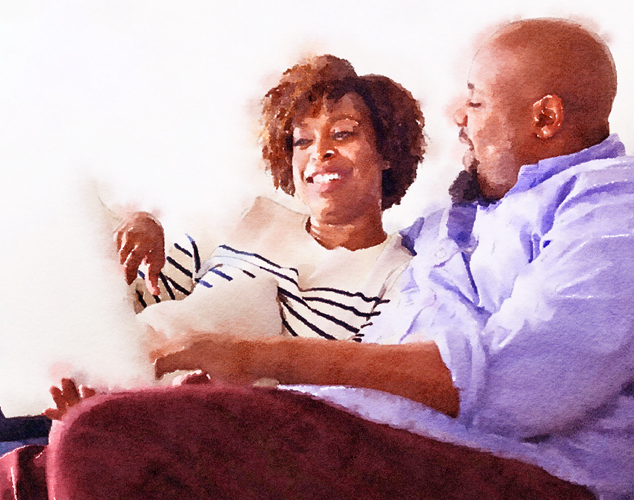Is therapy helping? Is our therapist helpful? These questions are not only fair, they are vital to be asked. Let’s talk about your therapist first. Couples will sometimes end therapy with frustration and dissatisfactions about how things went. When the couple tries again, with someone new, either directly following their effort or after a break (after recovering from their discouragement), responsible therapists ask about the reasons they discontinued or didn’t return to their previous therapist.
People have a variety of complaints and dissatisfactions:
“She never said much.” “He never seemed to suggest anything.” “She didn’t seem to understand our trouble.” “He talked too much.” “He gave exercises for us to do, but they seemed more from a recipe book than connected to our difficulties” “She seemed to always take my side and not understand my husband/wife.” “When I told him that I thought he was always on my wife/husbands side he became defensive and aggressively denied it.” “He hurt my feelings sometimes.” “She hurt my feelings and when I tried to talk about it she threw it back on me as if it was my psychological problem.” “There was something in his manner that always bothered me.”
Most couples will say that they did not pursue these concerns with their therapist. They eventually just left, dissatisfied.
There are two important criteria for judging whether your therapist has what it takes to help you. The first is that you have a good, strong sense that your therapist “gets” you, gets the relationship, and knows how to help.
The second is that when you have a problem with your therapist, his or her responsiveness to you helps with that problem. You should have a sense that he will own his mistakes, that he will look at himself, and that he will care about your experience in the most human and real way. You want a therapist who not only understands the territory of relationships, but also knows how to be in a relationship with you. Make sure you regularly bring up even the slightest negative concern about your therapist and about how therapy is going.
The earlier and more regularly you bring these things up, the more likely the collaborative project of therapy will become strong and helpful. You’ll also be able to know sooner, before investing resources, whether this will be a productive project.
Therapists are obviously as imperfect as everyone else. And the task of doing therapy is filled with relational complexity. Every experienced therapist could, at least from time to time, hear some of the complaints above. In fact, most of us believe that we have to make mistakes, and process those mistakes, to be truly helpful. When you voice your complaints to your therapist, this can lead, sometimes in powerful ways, to progress in the therapy.
Sometimes, early, it will seem clear that it is just a bad fit. Be sure to talk about the problem of fit with your therapist. You might be surprised by your therapist’s very helpful response. Speaking of this might galvanize a solid working relationship. Sometimes your negative impression will not be altered by your therapist’s response. A responsible therapist will then help you find someone else when this is the case.
Now let’s talk about checking on whether therapy is helping. This is both simple and complex. The simple part is that a lot about getting better does have to do with how much work you put into it. There is no getting around this. Couples who are very committed to improving their relationship will do so with only a little help. The more responsibility and the more clear your vision of where you want to go the more likely you will get there.
The complexity has to do with the kind and degree of difficulty that is inherent in human problems. Mostly the complexity has to do with our hurt and emotional pain and the ways our relationships build difficult patterns around that pain. It is normal for progress to sometimes lead to setbacks. As things improve; as we feel more safe, sometimes earlier hurts surface for attention.
Getting better also builds hope and when there is a return to older patterns we feel disappointed. Sometimes people become profoundly discouraged in the midst of a disappointing setback, so much so that things feel worse. But patterns and feelings need to be revisited a number of times for changes to become integrated. When patterns and feelings that have been ignored are given attention, it can become painful in a different way, but this usually leads to the integration of new experience, which means it becomes less painful.
If you made a line graph of progress in therapy it would clearly show an upward trend, but with dips, that can, at times, feel like no progress at all.
By and large, couple therapy should feel helpful. Your therapist’s understanding of the relationship and his empathy is helpful in itself. Your growing empathy for each other’s experience is a sign of improvement. Starting to untangle the patterns and building more positive ways of relating to each other are further signs of help.
If it is not being helpful in these ways it may mean that therapy is not on track. Of course, it also may mean that one or both of you are not getting enough help in voicing the degree of your distress or despair so that it can get on track. It is always helpful in therapy to discuss any sense that you might have that you are not progressing. It is a positive way to include your partner and your therapist in taking a measure of how the project of therapy is going.
I have made a practice of helping individuals and couples take their concerns in a positive way back to their own therapist. Please feel free to contact me for a consultation if you would like that kind of help.
Robert Ogner, July, 19th, 2008


